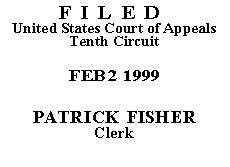

| CONSTANCE E. RHODES,
Plaintiff-Appellant, v. CITY OF AURORA, a Colorado corporation, Defendant-Appellee. |
|
Plaintiff alleges she was qualified for promotion to Administrative Assistant in the Utility Billing Section, but a lesser-qualified white female candidate, Ms. Norris, was promoted instead. In addition to being more qualified than Ms. Norris, plaintiff alleges she had more seniority and that defendant violated a policy to promote based on seniority. Defendant responded that Ms. Norris was selected not because of her race, but because she was the best qualified based on her experience, education and personality. On appeal, plaintiff asserts (1) the district court did not consider her evidence, and (2) the existence of disputed material facts precluded summary judgment.
We review de novo the district court's grant of summary judgment, viewing the record in the light most favorable to the party opposing summary judgment. See McKnight v. Kimberly Clark Corp., 149 F.3d 1125, 1128 (10th Cir. 1998). Summary judgment is appropriate if there is no genuine issue of material fact and the moving party is entitled to judgment as a matter of law. See Celotex Corp. v. Catrett, 477 U.S. 317, 322 (1986); Fed. R. Civ. P. 56(c). We construe liberally plaintiff's pro se pleadings. See Haines v. Kerner, 404 U.S. 519, 520-21 (1972).
Plaintiff complains that the district court unfairly disregarded her evidence on the ground that it was not in the proper form. The deposition testimony and documentary evidence were appropriate for consideration on summary judgment, and it is clear that the district court considered them. Opinions and conclusory allegations not supported by evidence, however, are insufficient to withstand summary judgment. See Kidd v. Taos Ski Valley, Inc., 88 F.3d 848, 853 (10th Cir. 1996).
We evaluate plaintiff's allegations that the district court unfairly rejected her evidence together with her claim that she established the existence of disputed material facts sufficient to resist summary judgment. The parties do not dispute the order of proof directed by the McDonnell Douglas burden-shifting scheme. See McDonnell Douglas Corp. v. Green, 411 U.S. 792, 802-04 (1973). Defendant conceded that plaintiff established a prima facie case and proffered evidence of its nondiscriminatory reason for promoting someone other than plaintiff. See Trujillo v. University of Colo. Health Sciences Ctr., 157 F.3d 1211, 1215 (10th Cir. 1998). Plaintiff was then required to produce evidence creating a material issue of fact that the defendant's reason was unworthy of belief. See id. Plaintiff had the ultimate burden to show that defendant intentionally discriminated against her on the basis of race. See Ortega v. Safeway Stores, Inc., 943 F.2d 1230, 1237 (10th Cir. 1991) (citing United States Postal Serv. Bd. of Governors v. Aikens, 460 U.S. 711, 714-15 (1983)).
Our review of the record finds substantial support for defendant's position, based on the applicants' résumés and interviews, that five applicants were qualified for the position and the successful candidate was chosen based on her superior attitude, enthusiasm and background, and that race did not affect the ultimate decision.
Plaintiff cites to her deposition testimony and that of coworkers to show that defendant's reasons for promoting Ms. Norris were unworthy of belief. Because none was familiar with the qualifications of the applicants, their opinion that plaintiff should have been promoted does not create an issue of fact that defendant's reasons for promoting Ms. Norris were unworthy of belief.
Although the record contains various claims that the decision not to promote plaintiff was unfair, the claims are too vague and unsubstantiated to defeat summary judgment. See Beaird v. Seagate Tech., Inc., 145 F.3d 1159, 1170 (10th Cir.), cert. denied, 119 S. Ct. 617 (1998).
Plaintiff also argues that the district court improperly rejected her evidence of a policy to promote based on seniority. The evidence on which she relies, however, does not establish a seniority policy. Instead, the evidence tends to show only that in some promotions and lateral transfers seniority may have been a factor. The failure to promote the more senior employee does not, standing alone, indicate a racial motive. See Durham v. Xerox Corp., 18 F.3d 836, 840 (10th Cir. 1994) ("Mere seniority does not support a finding that [a plaintiff] was more qualified for a different job.").
Plaintiff has not produced evidence to demonstrate that defendant's nondiscriminatory reason for promoting Ms. Norris was unworthy of belief. She has also presented no evidence that race was a factor in the promotion decision. Therefore, she has failed "to make a showing sufficient to establish the existence of an element essential to [her] case, and on which [she] will bear the burden of proof at trial." Celotex Corp., 477 U.S. at 322. Accordingly, the award of summary judgment to defendant was appropriate. See Anderson v. Liberty Lobby, Inc., 477 U.S. 242, 248 (1986) (summary judgment will be granted unless "the evidence is such that a reasonable jury could return a verdict for the nonmoving party").
The judgment is AFFIRMED. The mandate shall issue forthwith.
ENTERED FOR THE COURT
Circuit Judge
*. This order and judgment is not binding precedent, except under the doctrines of law of the case, res judicata, and collateral estoppel. The court generally disfavors the citation of orders and judgments; nevertheless, an order and judgment may be cited under the terms and conditions of 10th Cir. R. 36.3.
1. After examining the briefs and appellate record, this panel has determined unanimously that oral argument would not materially assist the determination of this appeal. See Fed. R. App. P. 34(a)(2); 10th Cir. R. 34.1(G). The case is therefore ordered submitted without oral argument.